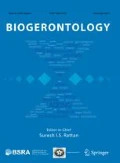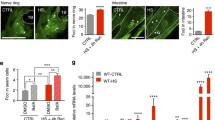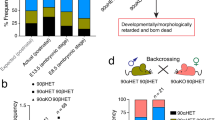Abstract
Human HSP27 is a small heat shock protein that modulates the ability of cells to respond to heat shock and oxidative stress, and also functions as a chaperone independent of ATP, participating in the proteasomal degradation of proteins. The expression of HSP27 is associated with survival in mammalian cells. In cancer cells, it confers resistance to chemotherapy; in neurons, HSP27 has a positive effect on neuronal viability in models of Alzheimerʼs and Parkinsonʼs diseases. To better understand the mechanism by which HSP27 expression contributes to cell survival, we expressed human HSP27 in the budding yeast Saccharomyces cerevisiae under control of different mutant TEF promoters, that conferred nine levels of graded basal expression, and showed that replicative lifespan and proteasomal activity increase as well as the resistance to oxidative and thermal stresses. The profile of these phenotypes display a dose–response effect characteristic of hormesis, an adaptive phenomenon that is observed when cells are exposed to increasing amounts of stress or toxic substances. The hormetic response correlates with changes in expression levels of HSP27 and also with its oligomeric states when correlated to survival assays. Our results indicate that fine tuning of HSP27 concentration could be used as a strategy for cancer therapy, and also for improving neuronal survival in neurodegenerative diseases.








Similar content being viewed by others
References
Alper H, Fischer C, Nevoigt E, Stephanopoulos G (2005) Tuning genetic control through promoter engineering. Proc Natl Acad Sci USA 102:12678–12683. https://doi.org/10.1073/pnas.0504604102
Aquilina JA, Shrestha S, Morris AM, Ecroyd H (2013) Structural and functional aspects of hetero-oligomers formed by the small heat shock proteins alphaB-crystallin and HSP27. J Biol Chem 288:13602–13609. https://doi.org/10.1074/jbc.M112.443812
Arrigo AP (1998) Small stress proteins: chaperones that act as regulators of intracellular redox state and programmed cell death. Biol Chem 379:19–26
Arrigo AP (2001) Hsp27: novel regulator of intracellular redox state. IUBMB Life 52:303–307. https://doi.org/10.1080/152165401317291165
Arrigo AP (2011) Structure-functions of HspB1 (Hsp27). Methods Mol Biol 787:105–119. https://doi.org/10.1007/978-1-61779-295-3_9
Arrigo AP (2017) Mammalian HspB1 (Hsp27) is a molecular sensor linked to the physiology and environment of the cell. Cell Stress Chaperones 22:517–529. https://doi.org/10.1007/s12192-017-0765-1
Arrigo AP, Suhan JP, Welch WJ (1988) Dynamic changes in the structure and intracellular locale of the mammalian low-molecular-weight heat shock protein. Mol Cell Biol 8:5059–5071. https://doi.org/10.1128/mcb.8.12.5059
Arrigo AP, Virot S, Chaufour S, Firdaus W, Kretz-Remy C, Diaz-Latoud C (2005) Hsp27 consolidates intracellular redox homeostasis by upholding glutathione in its reduced form and by decreasing iron intracellular levels. Antioxid Redox Signal 7:414–422. https://doi.org/10.1089/ars.2005.7.414
Awasthi N, Wagner BJ (2005) Upregulation of heat shock protein expression by proteasome inhibition: an antiapoptotic mechanism in the lens. Invest Ophthalmol Vis Sci 46:2082–2091. https://doi.org/10.1167/iovs.05-0002
Benesch JL et al (2010) The quaternary organization and dynamics of the molecular chaperone HSP26 are thermally regulated. Chem Biol 17:1008–1017. https://doi.org/10.1016/j.chembiol.2010.06.016
Calabrese EJ, Dhawan G, Kapoor R, Iavicoli I, Calabrese V (2015) What is hormesis and its relevance to healthy aging and longevity? Biogerontology 16:693–707. https://doi.org/10.1007/s10522-015-9601-0
Calderwood SK, Gong J (2016) Heat shock proteins promote cancer: it's a protection racket. Trends Biochem Sci 41:311–323. https://doi.org/10.1016/j.tibs.2016.01.003
Carper SW, Rocheleau TA, Storm FK (1990) cDNA sequence of a human heat shock protein HSP27. Nucleic Acids Res 18:6457. https://doi.org/10.1093/nar/18.21.6457
Cashikar AG, Duennwald M, Lindquist SL (2005) A chaperone pathway in protein disaggregation. Hsp26 alters the nature of protein aggregates to facilitate reactivation by Hsp104. J Biol Chem 280:23869–23875. https://doi.org/10.1074/jbc.M502854200
Chen H, Zheng C, Zhang Y, Chang YZ, Qian ZM, Shen X (2006) Heat shock protein 27 downregulates the transferrin receptor 1-mediated iron uptake. Int J Biochem Cell Biol 38:1402–1416. https://doi.org/10.1016/j.biocel.2006.02.006
Chen SF et al (2012) Autophagy-related gene 7 is downstream of heat shock protein 27 in the regulation of eye morphology, polyglutamine toxicity, and lifespan in Drosophila. J Biomed Sci 19:52. https://doi.org/10.1186/1423-0127-19-52
Chondrogianni N et al (2015) Proteasome activation: an innovative promising approach for delaying aging and retarding age-related diseases. Ageing Res Rev 23:37–55. https://doi.org/10.1016/j.arr.2014.12.003
Conti B et al (2006) Transgenic mice with a reduced core body temperature have an increased life span. Science 314:825–828. https://doi.org/10.1126/science.1132191
Criddle DN et al (2006) Menadione-induced reactive oxygen species generation via redox cycling promotes apoptosis of murine pancreatic acinar cells. J Biol Chem 281:40485–40492. https://doi.org/10.1074/jbc.M607704200
da Cunha FM, Demasi M, Kowaltowski AJ (2011) Aging and calorie restriction modulate yeast redox state, oxidized protein removal, and the ubiquitin-proteasome system. Free Radic Biol Med 51:664–670. https://doi.org/10.1016/j.freeradbiomed.2011.05.035
Dayalan Naidu S, Dinkova-Kostova AT (2017) Regulation of the mammalian heat shock factor 1. FEBS J 284:1606–1627. https://doi.org/10.1111/febs.13999
Degasperi A, Birtwistle MR, Volinsky N, Rauch J, Kolch W, Kholodenko BN (2014) Evaluating strategies to normalise biological replicates of Western blot data. PLoS ONE 9:e87293. https://doi.org/10.1371/journal.pone.0087293
Erjavec N, Larsson L, Grantham J, Nystrom T (2007) Accelerated aging and failure to segregate damaged proteins in Sir2 mutants can be suppressed by overproducing the protein aggregation-remodeling factor Hsp104p. Genes Dev 21:2410–2421. https://doi.org/10.1101/gad.439307
Ferreira-Junior JR, Digiampietri LA (2019) OVERFRAG: an overlapping DNA fragments generator for molecular cloning and synthetic biology. Data In Brief 23:103806. https://doi.org/10.1016/j.dib.2019.103806
Ferreira Junior JR, Spirek M, Liu Z, Butow RA (2005) Interaction between Rtg2p and Mks1p in the regulation of the RTG pathway of Saccharomyces cerevisiae. Gene 354:2–8. https://doi.org/10.1016/j.gene.2005.03.048
Filipcik P et al (2015) Intraneuronal accumulation of misfolded tau protein induces overexpression of Hsp27 in activated astrocytes. Biochim Biophys Acta 1852:1219–1229. https://doi.org/10.1016/j.bbadis.2015.03.003
Gan N, Wu YC, Brunet M, Garrido C, Chung FL, Dai C, Mi L (2010) Sulforaphane activates heat shock response and enhances proteasome activity through up-regulation of Hsp27. J Biol Chem 285:35528–35536. https://doi.org/10.1074/jbc.M110.152686
Gietz RD, Sugino A (1988) New yeast-Escherichia coli shuttle vectors constructed with in vitro mutagenized yeast genes lacking six-base pair restriction sites. Gene 74:527–534. https://doi.org/10.1016/0378-1119(88)90185-0
Gietz RD, Woods RA (2002) Transformation of yeast by lithium acetate/single-stranded carrier DNA/polyethylene glycol method. Methods Enzymol 350:87–96. https://doi.org/10.1016/s0076-6879(02)50957-5
Hanahan D (1983) Studies on transformation of Escherichia coli with plasmids. J Mol Biol 166:557–580. https://doi.org/10.1016/s0022-2836(83)80284-8
Heckman KL, Pease LR (2007) Gene splicing and mutagenesis by PCR-driven overlap extension. Nat Protoc 2:924–932. https://doi.org/10.1038/nprot.2007.132
Hino M, Kurogi K, Okubo MA, Murata-Hori M, Hosoya H (2000) Small heat shock protein 27 (HSP27) associates with tubulin/microtubules in HeLa cells. Biochem Biophys Res Commun 271:164–169. https://doi.org/10.1006/bbrc.2000.2553
Hosono R, Mitsui Y, Sato Y, Aizawa S, Miwa J (1982) Life span of the wild and mutant nematode Caenorhabditis elegans. Effects of sex, sterilization, and temperature. Exp Gerontol 17:163–172. https://doi.org/10.1016/0531-5565(82)90052-3
Hu J, Wei M, Mirisola MG, Longo VD (2013) Assessing chronological aging in Saccharomyces cerevisiae. Methods Mol Biol 965:463–472. https://doi.org/10.1007/978-1-62703-239-1_30
Huot J, Houle F, Spitz DR, Landry J (1996) HSP27 phosphorylation-mediated resistance against actin fragmentation and cell death induced by oxidative stress. Cancer Res 56:273–279
Huot J, Roy G, Lambert H, Chretien P, Landry J (1991) Increased survival after treatments with anticancer agents of Chinese hamster cells expressing the human Mr 27,000 heat shock protein. Cancer Res 51:5245–5252
Ito H, Okamoto K, Nakayama H, Isobe T, Kato K (1997) Phosphorylation of alphaB-crystallin in response to various types of stress. J Biol Chem 272:29934–29941. https://doi.org/10.1074/jbc.272.47.29934
Jovcevski B et al (2015) Phosphomimics destabilize Hsp27 oligomeric assemblies and enhance chaperone activity. Chem Biol 22:186–195. https://doi.org/10.1016/j.chembiol.2015.01.001
Kaeberlein M, McVey M, Guarente L (2001) Using yeast to discover the fountain of youth. Sci Aging Knowledge Environ 2001:pe1. https://doi.org/10.1126/sageke.2001.1.pe1
Kato K, Hasegawa K, Goto S, Inaguma Y (1994) Dissociation as a result of phosphorylation of an aggregated form of the small stress protein, hsp27. J Biol Chem 269:11274–11278
Kato K, Shinohara H, Goto S, Inaguma Y, Morishita R, Asano T (1992) Copurification of small heat shock protein with alpha B crystallin from human skeletal muscle. J Biol Chem 267:7718–7725
Kobayashi T (2011) How does genome instability affect lifespan?: roles of rDNA and telomeres. Genes Cells 16:617–624. https://doi.org/10.1111/j.1365-2443.2011.01519.x
Kruegel U et al (2011) Elevated proteasome capacity extends replicative lifespan in Saccharomyces cerevisiae. PLoS Genet 7:e1002253. https://doi.org/10.1371/journal.pgen.1002253
Kwolek-Mirek M, Zadrag-Tecza R (2014) Comparison of methods used for assessing the viability and vitality of yeast cells. FEMS Yeast Res 14:1068–1079. https://doi.org/10.1111/1567-1364.12202
Lamb MJ (1968) Temperature and lifespan in Drosophila. Nature 220:808–809. https://doi.org/10.1038/220808a0
Lambert H, Charette SJ, Bernier AF, Guimond A, Landry J (1999) HSP27 multimerization mediated by phosphorylation-sensitive intermolecular interactions at the amino terminus. J Biol Chem 274:9378–9385. https://doi.org/10.1074/jbc.274.14.9378
Landry J, Chretien P, Lambert H, Hickey E, Weber LA (1989) Heat shock resistance conferred by expression of the human HSP27 gene in rodent cells. J Cell Biol 109:7–15. https://doi.org/10.1083/jcb.109.1.7
Laporte D, Lebaudy A, Sahin A, Pinson B, Ceschin J, Daignan-Fornier B, Sagot I (2011) Metabolic status rather than cell cycle signals control quiescence entry and exit. J Cell Biol 192:949–957.https://doi.org/10.1083/jcb.201009028
Liao PC, Lin HY, Yuh CH, Yu LK, Wang HD (2008) The effect of neuronal expression of heat shock proteins 26 and 27 on lifespan, neurodegeneration, and apoptosis in Drosophila. Biochem Biophys Res Commun 376:637–641. https://doi.org/10.1016/j.bbrc.2008.08.161
Liu Z, Butow RA (2006) Mitochondrial retrograde signaling. Annu Rev Genet 40:159–185. https://doi.org/10.1146/annurev.genet.40.110405.090613
Longo VD, Shadel GS, Kaeberlein M, Kennedy B (2012) Replicative and chronological aging in Saccharomyces cerevisiae. Cell Metab 16:18–31. https://doi.org/10.1016/j.cmet.2012.06.002
Lu XY, Chen L, Cai XL, Yang HT (2008) Overexpression of heat shock protein 27 protects against ischaemia/reperfusion-induced cardiac dysfunction via stabilization of troponin I and T. Cardiovasc Res 79:500–508. https://doi.org/10.1093/cvr/cvn091
Lucijanic M et al (2017) Heat shock protein 27 (HSP27/HSPB1) expression is increased in patients with primary and secondary myelofibrosis and may be affecting their survival Leuk. Lymphoma 58:2497–2500. https://doi.org/10.1080/10428194.2017.1296146
Mehlen P, Briolay J, Smith L, Diaz-latoud C, Fabre N, Pauli D, Arrigo AP (1993) Analysis of the resistance to heat and hydrogen peroxide stresses in COS cells transiently expressing wild type or deletion mutants of the Drosophila 27-kDa heat-shock protein. Eur J Biochem 215:277–284. https://doi.org/10.1111/j.1432-1033.1993.tb18032.x
Miesbauer LR, Zhou X, Yang Z, Sun Y, Smith DL, Smith JB (1994) Post-translational modifications of water-soluble human lens crystallins from young adults. J Biol Chem 269:12494–12502
Molon M, Zadrag-Tecza R (2016) Effect of temperature on replicative aging of the budding yeast Saccharomyces cerevisiae. Biogerontology 17:347–357. https://doi.org/10.1007/s10522-015-9619-3
Mumberg D, Muller R, Funk M (1995) Yeast vectors for the controlled expression of heterologous proteins in different genetic backgrounds. Gene 156:119–122. https://doi.org/10.1016/0378-1119(95)00037-7
Nevoigt E, Kohnke J, Fischer CR, Alper H, Stahl U, Stephanopoulos G (2006) Engineering of promoter replacement cassettes for fine-tuning of gene expression in Saccharomyces cerevisiae. Appl Environ Microbiol 72:5266–5273. https://doi.org/10.1128/AEM.00530-06
Parcellier A et al (2003) HSP27 is a ubiquitin-binding protein involved in I-kappaBalpha proteasomal degradation. Mol Cell Biol 23:5790–5802. https://doi.org/10.1128/mcb.23.16.5790-5802.2003
Park PU, McVey M, Guarente L (2002) Separation of mother and daughter cells. Methods Enzymol 351:468–477. https://doi.org/10.1016/s0076-6879(02)51865-6
Parrella E, Longo VD (2008) The chronological life span of Saccharomyces cerevisiae to study mitochondrial dysfunction and disease. Methods 46:256–262. https://doi.org/10.1016/j.ymeth.2008.10.004
Perrin V et al (2007) Neuroprotection by Hsp104 and Hsp27 in lentiviral-based rat models of Huntington's disease. Mol Ther 15:903–911. https://doi.org/10.1038/mt.sj.6300141
Preville X et al (1999) Mammalian small stress proteins protect against oxidative stress through their ability to increase glucose-6-phosphate dehydrogenase activity and by maintaining optimal cellular detoxifying machinery. Exp Cell Res 247:61–78. https://doi.org/10.1006/excr.1998.4347
Pride H et al (2015) Long-lived species have improved proteostasis compared to phylogenetically-related shorter-lived species. Biochem Biophys Res Commun 457:669–675. https://doi.org/10.1016/j.bbrc.2015.01.046
Renkawek K, Stege GJ, Bosman GJ (1999) Dementia, gliosis and expression of the small heat shock proteins hsp27 and alpha B-crystallin in Parkinson's disease. NeuroReport 10:2273–2276. https://doi.org/10.1097/00001756-199908020-00009
Riezman H, Hase T, van Loon AP, Grivell LA, Suda K, Schatz G (1983) Import of proteins into mitochondria: a 70 kilodalton outer membrane protein with a large carboxy-terminal deletion is still transported to the outer membrane. EMBO J 2:2161–2168
Rodriguez KA, Valentine JM, Kramer DA, Gelfond JA, Kristan DM, Nevo E, Buffenstein R (2016) Determinants of rodent longevity in the chaperone-protein degradation network. Cell Stress Chaperones 21:453–466. https://doi.org/10.1007/s12192-016-0672-x
Rogalla T et al (1999) Regulation of Hsp27 oligomerization, chaperone function, and protective activity against oxidative stress/tumor necrosis factor alpha by phosphorylation. J Biol Chem 274:18947–18956. https://doi.org/10.1074/jbc.274.27.18947
Rossi JM, Lindquist S (1989) The intracellular location of yeast heat-shock protein 26 varies with metabolism. J Cell Biol 108:425–439. https://doi.org/10.1083/jcb.108.2.425
Rothstein R (1991) Targeting, disruption, replacement, and allele rescue: integrative DNA transformation in yeast. Methods Enzymol 194:281–301. https://doi.org/10.1016/0076-6879(91)94022-5
Sambrook J, Russell DW (2001) Molecular cloning: a laboratory manual, 3rd edn. Cold Spring Harbor Laboratory Press, Cold Spring Harbor
Schneider CA, Rasband WS, Eliceiri KW (2012) NIH Image to ImageJ: 25 years of image analysis. Nat Methods 9:671–675. https://doi.org/10.1038/nmeth.2089
Shanmugam G, Mohankumar A, Kalaiselvi D, Thiruppathi G, Nivitha S, Sundararaj P (2018) Phytochemicals-induced hormesis protects Caenorhabditis elegans against α-synuclein protein aggregation and stress through modulating HSF-1 and SKN-1/Nrf2 signaling pathways. Biomed Pharmacol 102:812–822. https://doi.org/10.1016/j.biopha.2018.03.128
Simon S et al (2013) Analysis of the dominant effects mediated by wild type or R120G mutant of alphaB-crystallin (HspB5) towards Hsp27 (HspB1). PLoS ONE 8:e70545. https://doi.org/10.1371/journal.pone.0070545
Stangl K et al (2002) Inhibition of the ubiquitin-proteasome pathway induces differential heat-shock protein response in cardiomyocytes and renders early cardiac protection. Biochem Biophys Res Commun 291:542–549. https://doi.org/10.1006/bbrc.2002.6476
Toth ME et al (2013) Overexpression of Hsp27 ameliorates symptoms of Alzheimer's disease in APP/PS1 mice. Cell Stress Chaperones 18:759–971. https://doi.org/10.1007/s12192-013-0428-9
Verma R, Chen S, Feldman R, Schieltz D, Yates J, Dohmen J, Deshaies RJ (2000) Proteasomal proteomics: identification of nucleotide-sensitive proteasome-interacting proteins by mass spectrometric analysis of affinity-purified proteasomes. Mol Biol Cell 11:3425–3439. https://doi.org/10.1091/mbc.11.10.3425
Vos MJ, Kanon B, Kampinga HH (2009) HSPB7 is a SC35 speckle resident small heat shock protein. Biochim Biophys Acta 1793:1343–1353. https://doi.org/10.1016/j.bbamcr.2009.05.005
Wang HD, Kazemi-Esfarjani P, Benzer S (2004) Multiple-stress analysis for isolation of Drosophila longevity genes. Proc Natl Acad Sci USA 101:12610–12615. https://doi.org/10.1073/pnas.0404648101
Wyttenbach A, Sauvageot O, Carmichael J, Diaz-Latoud C, Arrigo AP, Rubinsztein DC (2002) Heat shock protein 27 prevents cellular polyglutamine toxicity and suppresses the increase of reactive oxygen species caused by huntingtin. Hum Mol Genet 11:1137–1151. https://doi.org/10.1093/hmg/11.9.1137
Xiao R, Zhang B, Dong Y, Gong J, Xu T, Liu J, Xu XZ (2013) A genetic program promotes C. elegans longevity at cold temperatures via a thermosensitive TRP channel. Cell 152:806–817. https://doi.org/10.1016/j.cell.2013.01.020
Zhao M, Shen F, Yin YX, Yang YY, Xiang DJ, Chen Q (2012) Increased expression of heat shock protein 27 correlates with peritoneal metastasis in epithelial ovarian cancer. Reprod Sci 19:748–753. https://doi.org/10.1177/1933719111432875
Zourlidou A et al (2007) Hsp27 overexpression in the R6/2 mouse model of Huntington's disease: chronic neurodegeneration does not induce Hsp27 activation. Hum Mol Genet 16:1078–1090. https://doi.org/10.1093/hmg/ddm057
Acknowledgements
This work was supported by Grants #2017/09938-2, #2013/07937-8 and #2016/11724-8, São Paulo Research Foundation (FAPESP) and Finance Code 001 from the Coordenação de Aperfeiçoamento de Pessoal de Nível Superior—Brasil (CAPES).
Author information
Authors and Affiliations
Corresponding author
Additional information
Publisher's Note
Springer Nature remains neutral with regard to jurisdictional claims in published maps and institutional affiliations.
Electronic supplementary material
Below is the link to the electronic supplementary material.
Rights and permissions
About this article
Cite this article
Camandona, V.L., Rios-Anjos, R.M., Alegria, T.G.P. et al. Expression of human HSP27 in yeast extends replicative lifespan and uncovers a hormetic response. Biogerontology 21, 559–575 (2020). https://doi.org/10.1007/s10522-020-09869-9
Received:
Accepted:
Published:
Issue Date:
DOI: https://doi.org/10.1007/s10522-020-09869-9




